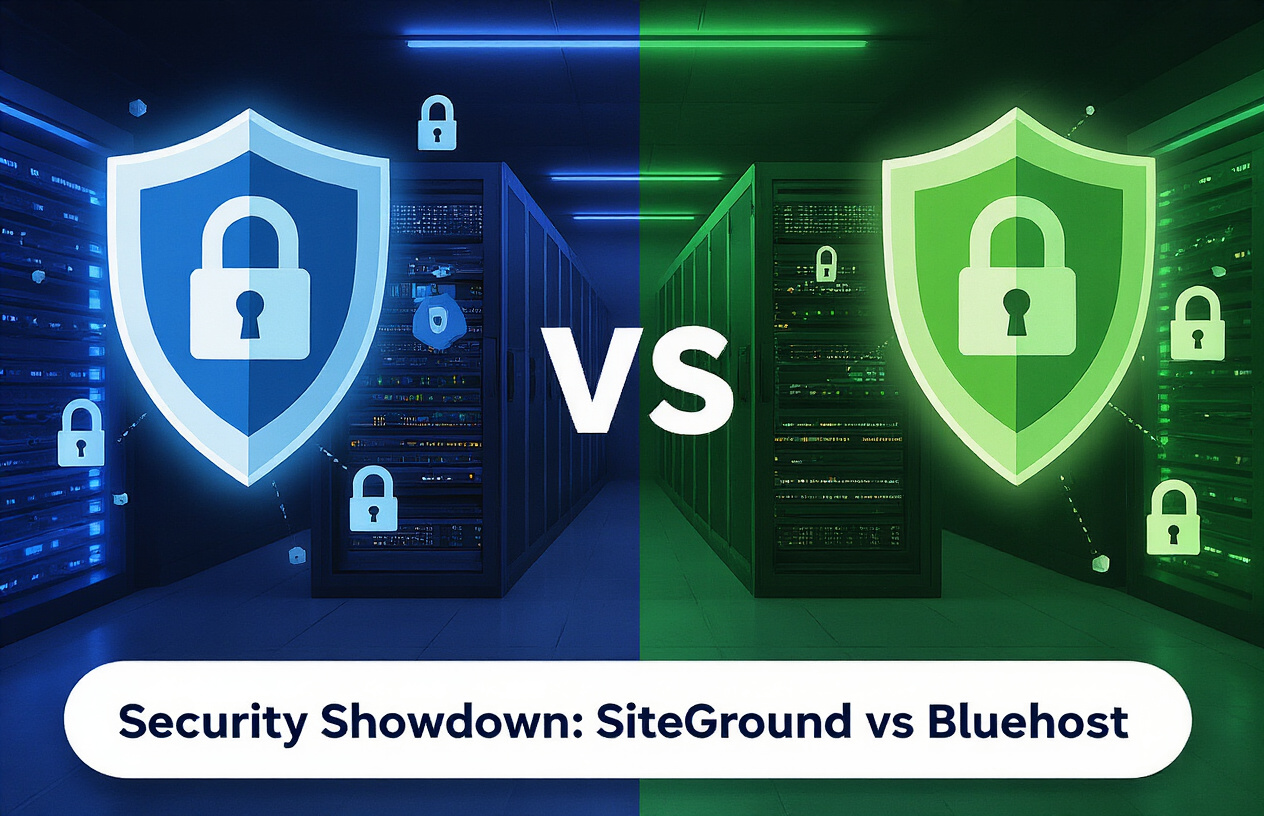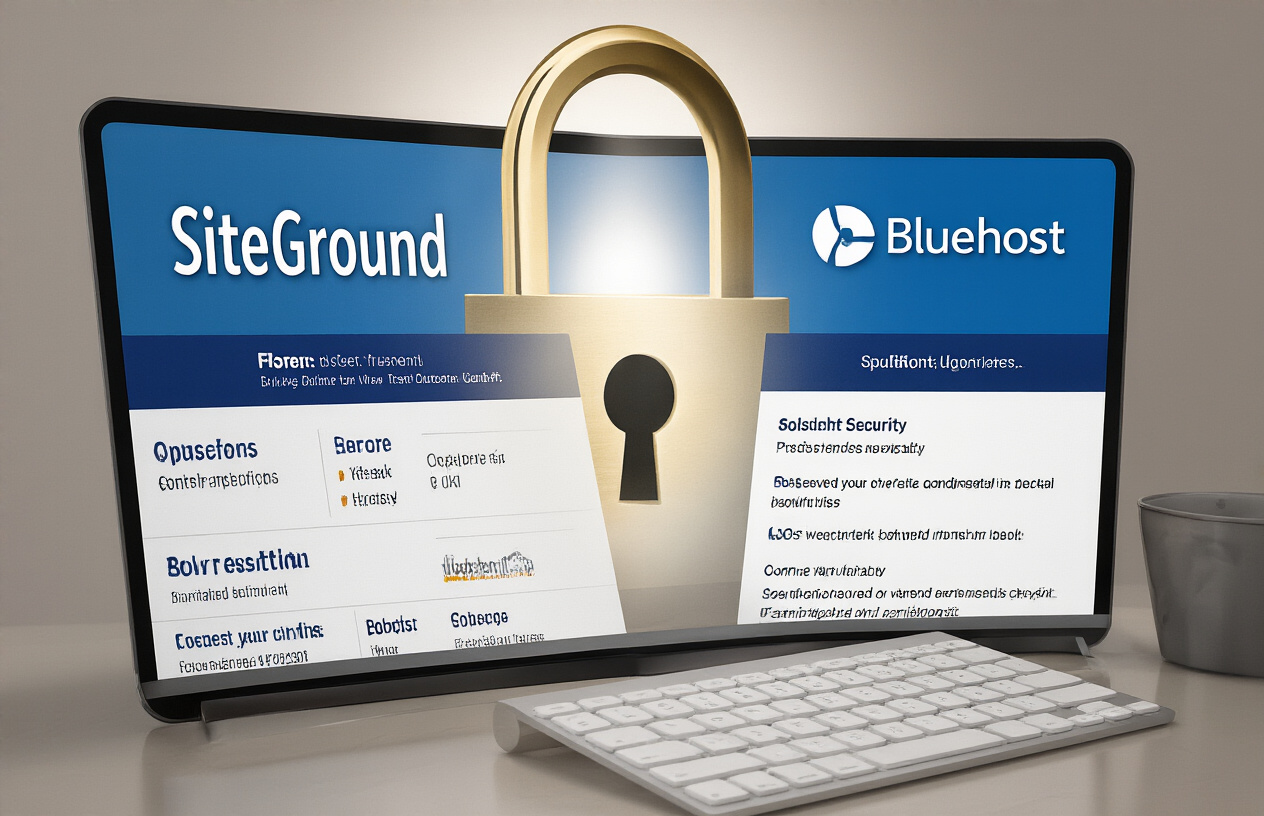You’ve spent hours building your website, perfecting every page, and now you’re ready to launch. But wait – have you considered what happens if a hacker targets your site tomorrow?
Website security isn’t just some tech jargon to ignore. It’s the difference between business as usual and a complete disaster that could cost you customers, rankings, and revenue.
When comparing SiteGround vs Bluehost for security features, the details matter more than most website owners realize. One platform might save you thousands in potential recovery costs while the other leaves dangerous vulnerabilities exposed.
I’ve analyzed both hosting providers from every security angle, and what I found might surprise you. The difference between their protection systems isn’t just about features—it’s about fundamental approaches to keeping your site safe.
So which host actually delivers on their security promises?
SiteGround’s Security Architecture
A. SiteGround’s server-level security measures
You’ll find SiteGround takes security seriously with their custom Linux containers that isolate your account from others on shared servers. Their proprietary AI anti-bot system blocks up to 2 million brute-force attempts daily, while their Web Application Firewall (WAF) filters out malicious traffic before it reaches your site. These proactive measures work silently in the background, giving you peace of mind.
B. Real-time security monitoring and threat detection
SiteGround watches your site 24/7 with their advanced monitoring systems. You benefit from their security team constantly scanning for suspicious activities and vulnerabilities. When they detect something fishy, they’ll often fix issues before you even know there’s a problem. Their systems update security rules every 30 minutes, keeping you protected against emerging threats automatically.
C. SSL certificate offerings and implementation
You get free Let’s Encrypt SSL certificates with every SiteGround plan. The best part? They’re automatically issued and renewed, so you don’t have to fiddle with technical setup. For businesses needing more security, you can easily upgrade to premium Wildcard or EV certificates through your dashboard. Their one-click SSL installation means your site can be secure in minutes rather than hours.
D. Account isolation technology
Your hosting environment stays protected with SiteGround’s innovative account isolation technology. This means even if another site on your shared server gets compromised, your files remain untouched. You’ll appreciate how they implement PHP isolation that prevents malicious scripts from accessing your data. This robust separation creates a security bubble around your website that significantly reduces cross-site contamination risks.
E. Automated backup systems and recovery options
You never have to worry about losing your site with SiteGround’s daily automatic backups. Their system stores up to 30 copies of your website, giving you plenty of restoration points. When things go wrong, you can roll back your site with just a few clicks through their user-friendly backup tool. For extra peace of mind, you can also create manual backups before making major site changes.
Bluehost’s Security Framework
A. Bluehost’s core security infrastructure
When you choose Bluehost, you’re getting solid security basics. Their infrastructure includes automated backups, SSL certificates, and server-level protections that work behind the scenes. You’ll appreciate their firewall implementation that blocks suspicious traffic before it reaches your site.
B. Malware detection and removal capabilities
Bluehost watches your back with continuous malware scanning. You get real-time threat detection that alerts you to potential issues before they become problems. Their SiteLock partnership gives you professional-grade tools to clean infected files without technical headaches.
C. DDoS protection systems
Your site stays online even during attack attempts thanks to Bluehost’s robust DDoS protection. You won’t have to worry about traffic surges taking down your website. Their network-level filtering identifies and blocks malicious traffic patterns automatically, keeping your visitors connected.
D. Resource protection measures
Your account resources stay safe with Bluehost’s isolation technology. You’ll benefit from their CPU protection systems that prevent neighboring accounts from hogging server resources. Their proactive monitoring ensures your site maintains performance even when others on the shared server experience high traffic.
The battle between SiteGround and Bluehost reveals significant differences in their security approaches. SiteGround edges ahead with its proactive security architecture, featuring AI-powered protection, more frequent updates, and robust isolation technology. While Bluehost offers solid security foundations, it lacks some of the advanced features and rapid response capabilities that make SiteGround particularly appealing for security-conscious website owners. Both platforms maintain good data protection practices and compliance standards, though their security implementations affect performance differently.
For those prioritizing website security, SiteGround represents the better investment despite its higher price point. The additional cost translates to more comprehensive protection, faster security response times, and specialized support for security concerns. However, your choice should ultimately align with your specific security needs, budget constraints, and the sensitivity of the data you’re handling. Remember that even the best hosting security should be complemented by good security practices on your end for maximum protection.






